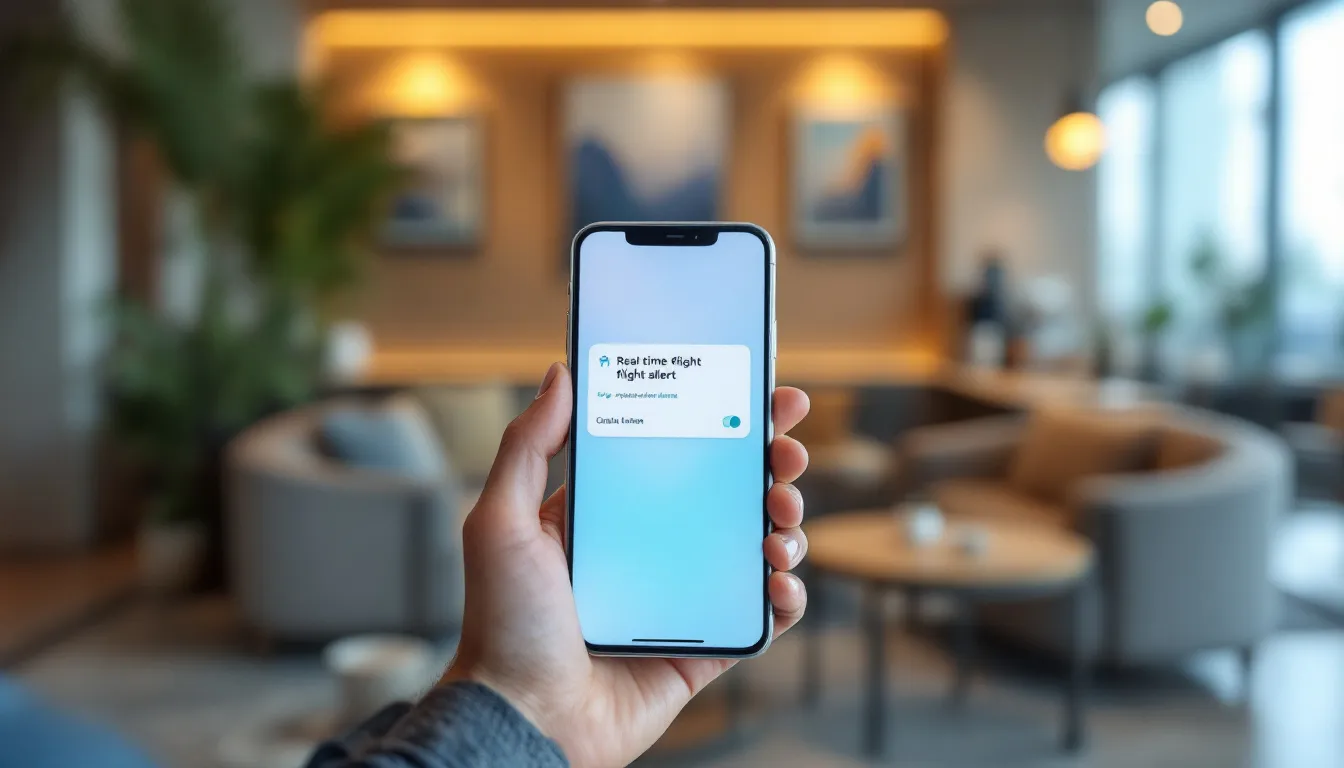RCS Business Messaging in Travel: Real-Time Flight Alerts for Hospitality

In the fast-paced world of travel and hospitality, staying ahead of the game means finding innovative ways to communicate with customers. One of the most significant advancements in this field is RCS Business Messaging. This technology not only enhances communication but also transforms how businesses interact with their travelers by providing real-time flight alerts and more.
Understanding RCS Business Messaging
RCS, or Rich Communication Services, is a messaging protocol that modernizes traditional SMS by allowing richer media and interactive features. Released as a successor to SMS, RCS offers a more engaging platform for businesses to connect with their customers.
At its core, RCS provides an array of functionalities that SMS cannot, such as images, videos, and suggested actions. This leads to a more comprehensive communication experience, making it an invaluable tool for industries that rely heavily on immediate updates and customer engagement.
The Evolution of RCS Messaging
The transition to RCS began as mobile carriers sought ways to enhance user experience. It further gained momentum as messaging apps became popular, showing the demand for a richer communication experience. As companies recognized the potential, they began integrating RCS in customer service strategies, enhancing customer interactions significantly.
With the support of major players like Google, RCS quickly became the gold standard for business messaging, empowering brands across various sectors—including travel and hospitality—to reach their audience effectively. The rise of RCS also coincided with the growing importance of mobile-first strategies, as consumers increasingly rely on their smartphones for communication and information. This shift has prompted businesses to rethink their messaging approaches, focusing on creating seamless and engaging interactions that meet customer expectations.
Key Features of RCS Business Messaging
Distinct from conventional SMS, RCS offers several key attributes: user verification, enhanced visual elements, and interactivity. User verification ensures that customers know they are communicating with an authentic brand, instilling trust and reliability.
Moreover, the ability to include images and buttons allows businesses to create visually appealing messages that capture attention. This functionality can drive engagements, such as reservations and updates, making the conversation two-way and fluid. Additionally, RCS supports rich analytics, enabling businesses to track engagement metrics and optimize their messaging strategies based on real-time feedback. This data-driven approach not only enhances customer satisfaction but also helps brands refine their marketing efforts, ensuring they remain competitive in an ever-evolving digital landscape.
The Role of RCS Messaging in the Travel Industry
In the travel sector, communication is pivotal. RCS Business Messaging plays an instrumental role in enhancing the overall customer experience by providing real-time updates and engaging content.

Travelers often find themselves in situations where timely information is vital. RCS messaging can facilitate this by sending updates on flight statuses, gate changes, and more directly to customers' devices. This immediacy not only improves efficiency but also helps in building customer loyalty.
Enhancing Communication in Travel
With travelers increasingly seeking timely information, employing RCS allows travel companies to meet and even exceed expectations. It transforms the static communication model of SMS into a dynamic exchange—where customers can interact directly through their messages.
After booking, customers can receive a series of personalized messages throughout their journey, from check-in reminders to local tips for their destination. This constant engagement keeps travelers informed and connected, enhancing their overall experience. For example, a traveler might receive a message suggesting popular local restaurants or attractions based on their preferences, making their trip more enjoyable and tailored to their interests. This level of personalization not only fosters a sense of care from the travel provider but also encourages repeat business as customers feel valued and understood.
Real-Time Information Sharing
The power of real-time data sharing is transformative. RCS enables airlines and hotels to share critical information right at the moment it’s needed. For instance, flight delays or cancellations can be communicated instantly, allowing travelers to make alternative plans as needed.
This immediacy extends beyond just flight-related notifications. Hotels can use RCS for room availability updates or check-in procedures, enhancing convenience and streamlining the user experience. Furthermore, RCS can facilitate seamless communication for travelers who may need assistance during their stay, such as requesting extra amenities or inquiring about local transportation options. By integrating RCS into their communication strategies, travel companies can create a more cohesive and responsive environment, ensuring that every aspect of the traveler’s journey is as smooth and enjoyable as possible. This not only enhances customer satisfaction but also positions travel brands as leaders in innovation, setting them apart in a competitive industry.
Real-Time Flight Alerts: A Game Changer for Hospitality
As customers demand more from their travel experience, real-time alerts have emerged as a game changer in hospitality. The ability to receive updated information about their travel itinerary directly impacts customer satisfaction.

When delays occur, immediate notifications can ease frustration by allowing travelers to adjust their plans proactively. Moreover, the engaging nature of RCS messaging makes it possible for companies to offer helpful suggestions, such as rebooking options or alternative routes.
The Importance of Timely Flight Information
Timeliness is everything in the travel industry. Whether it's sending a text alert regarding check-in times or updating flight status, RCS provides a vital communication pathway that can make or break a traveler's experience.
In fact, studies have shown that passengers are more likely to appreciate a company that delivers relevant updates. This can translate to repeat business and positive word-of-mouth recommendations—essential aspects in the competitive hospitality market.
Additionally, timely flight information can also foster a sense of trust between travelers and service providers. When customers feel informed and in control, they are more likely to have a positive perception of the brand. This trust can lead to increased loyalty, as travelers are more inclined to choose a service that keeps them updated over competitors who may not prioritize communication.
How RCS Messaging Facilitates Real-Time Alerts
RCS Messaging simplifies the transmission of instant flight alerts. It allows businesses to create messages that include links to check-in options, web pages with updated information on rescheduled flights, and even options to contact customer service—all from within the message.
This level of interactivity marks a significant advancement over traditional SMS, allowing passengers to take action right away rather than seeking information through multiple channels.
Moreover, RCS messaging can be tailored to provide personalized experiences based on a traveler’s preferences and past behaviors. For instance, if a frequent flyer typically opts for window seats or has dietary restrictions, the alerts can include personalized suggestions that cater to these needs. This not only enhances the travel experience but also reinforces the brand’s commitment to customer service, setting a new standard in the hospitality industry.
The Impact of RCS Messaging on Customer Experience
The integration of RCS Business Messaging has far-reaching implications for customer experience. When executed correctly, it can transform every traveler’s journey into a seamless adventure.

From the moment a customer books their flight to the time they arrive at their destination, RCS messaging enhances connectivity and engagement. It fosters a sense of ongoing communication, making travelers feel valued and prioritized.
Improving Customer Satisfaction with RCS Messaging
RCS messaging’s capacity for personalization ensures that messages resonate with travelers. Personalization breeds loyalty, as recipients feel the communication speaks directly to their needs.
Trust is another critical component of customer satisfaction, and RCS messages embody that. Customers see verified messages from their airline or hotel, allowing them to engage confidently—knowing they aren’t being misled.
Moreover, the interactive features of RCS messaging allow businesses to provide rich content that enhances the travel experience. For instance, airlines can send real-time flight updates, including gate changes and boarding times, while hotels can share local attractions and dining recommendations tailored to the traveler’s preferences. This level of detail not only keeps customers informed but also enriches their journey, making it more enjoyable and memorable.
The Future of Customer Service in Hospitality
As customer service continues to evolve, integrating RCS into hospitality operations appears indispensable. It is not just about addressing complaints anymore; it's about anticipating traveler needs and extending a helping hand even before the request is made.
We can expect businesses in the travel sector to increasingly adopt RCS messaging as a core component of their customer service strategies. The evolution will undoubtedly lead to enhanced interaction, improved brand loyalty, and elevated customer satisfaction.
In addition to personalized communication, RCS messaging also opens the door for proactive customer service. For example, hotels can send pre-arrival messages asking if guests have any special requests, such as dietary restrictions or room preferences. This not only demonstrates attentiveness but also allows for a more tailored experience upon arrival. As the technology continues to advance, we may see even more innovative uses of RCS, such as integrating chatbots that can handle inquiries and bookings directly within the messaging platform, further streamlining the customer journey.
Challenges and Solutions in Implementing RCS Messaging
While the benefits of RCS messaging are clear, organizations often encounter challenges during implementation. Understanding these hurdles is critical for successful adoption.
However, with the right strategies and tools, many of these obstacles can be effectively navigated, paving the way for successful use of RCS technology.
Overcoming Technical Hurdles
Technical challenges, including interoperability between devices and platforms, often deter businesses from adopting RCS. However, leveraging third-party services and collaborating with mobile carriers can facilitate smooth integration and function.
Furthermore, investing in training for staff members responsible for deploying RCS can alleviate many technical concerns. Knowledgeable teams equipped with the right tools can address issues before they escalate, ensuring a seamless experience for customers. Additionally, organizations can benefit from conducting pilot programs to test RCS functionalities in a controlled environment. This approach allows them to identify potential issues early on and gather valuable feedback from users, which can be instrumental in refining the overall implementation strategy.
Addressing Privacy and Security Concerns
Customer privacy and data security play a pivotal role in implementing any messaging platform. RCS must ensure robust measures are in place to protect user data, foster trust, and adhere to regulations.
Establishing transparent privacy policies and utilizing end-to-end encryption is vital to demonstrate a commitment to safeguarding customer information. When clients are assured of their data’s security, their willingness to engage with RCS messaging improves significantly. Additionally, organizations should consider conducting regular security audits and assessments to identify vulnerabilities within their RCS systems. By proactively addressing potential threats and keeping up with the latest security protocols, businesses can enhance their defenses against data breaches and maintain customer confidence in their messaging services.
The Future of RCS Business Messaging in Travel and Hospitality
The prospects for RCS Business Messaging in travel and hospitality appear promising. As technology continues evolving, so will the capabilities of RCS messaging.
Travel companies that embrace RCS can expect a revolution in how they engage with customers—enabling richer experiences that can set them apart from competitors.
Emerging Trends in RCS Messaging
Real-time customer engagement, personalization, and automation are traits that will shape the future of RCS messaging. As travel preferences become more varied, utilizing data analytics will allow businesses to tailor experiences to meet specific needs.
Moreover, innovations in AI can lead to even smarter RCS messaging systems that comprehend customer intentions and sentiments, facilitating better conversations. Such advancements will make customer interactions smoother and more productive.
In addition to these technological advancements, the integration of multimedia elements within RCS messages can significantly enhance customer engagement. Travel companies can share high-quality images, videos, and interactive content directly within the messaging platform, allowing potential travelers to visualize their experiences before making a booking. This immersive approach not only captivates the audience but also helps in building trust and excitement around the services offered.
The Potential of RCS Messaging in Post-Pandemic Travel
The travel industry is on the path to recovery post-pandemic, and RCS messaging will play a vital role in this resurgence. It can enhance contactless communication between travelers and service providers, making health and safety communications straightforward.
As the industry adapts to changing traveler preferences, RCS will remain at the forefront of enhancing customer experiences through timely updates and engaging interactions. The future of travel and hospitality, intertwined with RCS messaging, promises enhanced journeys and unrivaled experiences for every traveler.
Additionally, the ability to send rich notifications about travel itineraries, gate changes, and last-minute offers via RCS can significantly improve the overall travel experience. By keeping travelers informed in real-time, companies can reduce anxiety and enhance satisfaction, making them more likely to return for future trips. This proactive approach to communication not only fosters loyalty but also positions businesses as reliable partners in the travel journey, ready to assist at every turn.
Ready to Elevate Your Travel Customer Experience?
Embrace the future of travel and hospitality communication with nativeMsg, the RCS Business Messaging Creator. Transform your customer interactions into dynamic, interactive experiences that captivate and engage. With our easy-to-use platform, you can create rich, personalized messaging campaigns that resonate with travelers and drive loyalty. Don't miss out on the opportunity to revolutionize how you connect with your audience. Get Started today and take the first step towards a more connected and satisfying travel experience for your customers.
